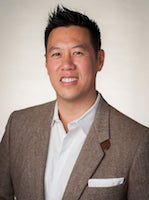
Confidence can be an asset. Imagine being confident enough to turn down a plum post-clerkship signing bonus, move to a foreign country with a loose grasp of the local culture and languages, and be the only overseas attorney interviewing for the first lawyer position for a hot Singaporean startup.
Not only do you outline your plan for the company’s legal, compliance, and data protection departments — a challenge for an emerging tech company in Asia with 400 employees that just completed a US$23 million Series B round of financing — but you also offer to initially work for free to prove your worth. That is exactly how Christopher Chan became general counsel of RedMart, a Singapore-based online grocer and logistics company, almost three years ago.

Chan handled various issues related to the e-commerce regulations that were forming in the region during that period, all while earning the trust of the founders. He worked for almost two years without any support from outside counsel or internal auxiliary as the company grew exponentially and quadrupled headcount.
Ever resourceful, he obtained grants to help cover some intellectual property (IP) filing costs, developed internal documentation using many of ACC’s resources, and tapped his vast network of connections to implement solutions for the startup. “I worked nonstop, and it was the ultimate testing ground for a lawyer. Just get your hands dirty, touch everything, and try to solve more problems, so your business teams can continue growing and raising funds,” he advises.
The most important factor for him though is “knowing the business.” To do this, he routinely picked groceries, took customer service calls, and even made deliveries to families. This hands-on approach with pragmatic solutions gained the trust and respect of his colleagues.
Chan’s ability to prioritize tasks and ascertain risks allowed him to take on an enormous workload. “I like bringing order from disorder, and working at a fast-paced startup is something that appealed to me,” he says. “If you want to nitpick and have everything perfect, a startup is not the place for that.” Chan internalized the business mentality. He constantly weighed the risks. If an idea was low risk, he would usually proceed. “If it’s high risk, that’s where you need to put your foot down,” he cautions. Managing risk doesn’t only mean legal and commercial exposure. In the age of social media, reputational harm can be just as significant. Startups must make decisions holistically but also quickly.
Chan illustrates his all-encompassing mandate by explaining his approach to data protection laws. While the European Union is known for its stringent data regulations and the United States is generally more lenient, many Asian countries take a wait-and-see approach. Singaporean consumers are skeptical of using credit cards for online purchases, so Chan partnered with Singapore’s Personal Data Protection Commission to promote e-commerce in a TV show produced by the government. In the show, a well-known local actor and Chan showed how poorly run businesses could endanger your personal data and how well-run companies, like RedMart, could protect it.
If you want to nitpick and have everything perfect, a startup is not the place for that.
— Christopher Chan, General Counsel, RedMart
The video playfully explained how RedMart uses third-party systems to protect personal information. Chan compares it to the way companies like Uber manage a customer’s personal information. Uber drivers don’t have a customer’s actual phone number — it routes through a calling system for calls and messaging. When the delivery driver for RedMart arrives, they only have the customer’s name and address but are not given their other particulars. If a driver or customer needs to call or message one another, it routes through secured third parties.
Thanks to the Data Privacy Commission’s approval, the show aired on primetime TV and online to the entire country — helping raise the company’s profile. The prime minister of Singapore even mentioned shopping on RedMart in his National Day address. The episode was a chance for Chan to wear his government relations hat, one of the many metaphorical hats he has worn during his time at the company.
The acquisition
On November 2, 2016, Singapore-based Lazada, a larger e-commerce site that operates in six Southeast Asian countries, publicly announced that it would fully acquire RedMart. It was the first time Chan tapped outside counsel to assist him. Until then, he had done everything himself, from employment contracts to arguing a labor case, to driver car accidents, and data privacy, and even compliance. Even with his varied experience, Chan had never encountered a deal as complex as the Lazada offer.
RedMart had over 80 separate investors from around the world that had contributed small amounts to millions of dollars. Alibaba, the Chinese e-commerce conglomerate, had recently bought a US$1 billion controlling stake in German-owned Lazada, which added to the international hodgepodge. And to add to the pressure, the deal had to go from term sheet to closing in under two weeks.
“To put this all in perspective, I’m one in-house lawyer with an associate and a partner from Jones Day going against four major law firms and one of the largest in-house teams in Southeast Asia on an extremely expedited [mergers and acquisitions] schedule with contentious parties on all sides,” Chan recalls. “At the same time, our company was going through many changes. We had to manage employee morale and the many negative rumors in the market.” On top of that pressure, he was working from his bed, recovering from major knee surgery. It was one of the most challenging times in his life.
Once again, Chan used his professional network to help him close the deal. While he was establishing himself and job searching in Singapore, he would invite lawyers to meet up for drinks or to discuss different issues. Gladys Chun, general counsel of Lazada, happened to see a panel Chan was speaking on and approached him after the event. He invited her to a networking opportunity, and they stayed in touch. Later, they found themselves on the opposite sides of one of the most significant mergers of the year.
The established trust made it possible for them to work together from the immediate outset despite being highly contentious commercially. “The practice of law has a certain code, and we see it less and less, which is unfortunate. There’s a certain honor to our profession that I believe in, and I know that Gladys does too, and it’s to do things the right way,” Chan says. The deal saved the company, and its 1,300 employees, allowing it to continue selling groceries to the people of Singapore.
Finding an identity
Chan explains that his confidence took years to develop, but is a direct result of his diverse life experiences and choices. Born in Cincinnati, Ohio, the eldest of three children of immigrants from Hong Kong, he was raised in Cherry Hill, New Jersey, a suburb of Philadelphia. Like most Asian kids in the United States, he half jokes, he was expected to be either an engineer or a doctor — a career in law never crossed his mind (both his younger siblings are successful medical doctors). He worked hard in school, and he studied biology, psychology, and chemistry at Duke University. He concentrated in marine biology and neuroscience, still planning to go to medical school.
He got his first taste of the expat life when he did a semester in Bermuda, where he did a lot of diving to satisfy his marine biology concentration. He looked for more opportunities to live in exotic places and wound up doing cancer research at the University of Hawaii one summer.
There’s a certain honor to our profession that I believe in… and it’s to do things the right way.
— Christopher Chan, General Counsel, RedMart
After graduating from Duke in 2001, Chan was hired by Synygy, a consulting firm, where he helped pharmaceutical companies figure out the behavioral and financial mechanisms that motivated salespeople. During this time in the early 2000s, businesses explored globalization and outsourcing to India. The firm was looking for someone to go to Pune, India to train Indian MBA graduates to be US-styled management consultants. He traveled and lived in India for months at a time, further expanding his knowledge of how businesses operate in the global marketplace and developing his first appreciation for the rule of law.
Gradually, a more concrete career path began to emerge. Chan talked to friends who were in law school and realized that intellectual property was a way to meld his science background, business skills, and a growing infatuation with the law. Chan remembers taking the LSAT late in the spring of 2004 and applying to law schools after most deadlines.
He received a full scholarship to the University of Akron for that same year. The smaller law school gave him the chance to interact with his law professors and classmates, and fully immerse himself in the experience. As a slightly more mature student with a few years of work experience, he admits that he took law school much more seriously than undergrad.
The work paid off. Chan earned an externship at the Sixth Circuit Court of Appeals under Judge Deborah Cook in Akron during his first summer of law school. At the same time, he got an internship with the Bridgestone Corporation, the tire company, also based in Akron. He worked with the chief IP counsel at the time, Jon Wood, whom Chan credits with pushing his career toward IP law, and who continues to be a mentor for him.
Chan transferred to Case Western Reserve School of Law in Cleveland, Ohio for his final two years of law school, but continued to work with Wood — who made helpful introductions for Chan to work with the law firm of Finnegan, Henderson, Farabow, Garrett & Dunner, LLP in Washington, DC upon graduation.
He was overjoyed that a top-tier firm would take a chance on someone who was initially accepted into a relatively unknown law school and wanted to prove himself. Despite his connection with Wood, he didn’t know many other lawyers and felt out of place when he first started.
That began to change when one of his partners stopped by his desk and invited him to attend a DC Asian Pacific American Bar Association dinner. That night the keynote speaker was William Tong, state representative who later ran for US Senate. At this point, Chan was thinking about his identity as a young lawyer.
“In college, I was this Asian kid who wasn’t hanging out with the Asian cliques or involved in the APA community,” he explains, but after seeing Tong, the first Asian American in the Connecticut House of Representatives, inspirationally speak at the dinner about his identity struggles and breaking stereotypes, he went up to talk to him. Tong took a liking to Chan and told him that he could use his skills to be an asset to the Asian American community in DC.
Chan soon got involved with the Asian Pacific American Bar Association in Washington, DC, which is a part of the National Asian Pacific Bar Association. He worked with the Educational Foundation and was later elected president. The foundation helps young law students and gives them practical advice, such as networking tips, etiquette, resume reviews, and mock interviews — things that someone who doesn’t have a lawyer in the family might not understand. He also worked with the local and national organizations while they lobbied to get more Asian Americans in government, and on the federal bench.
Asian Americans represent about six percent of the US population but are significantly under represented with less than one percent on the federal judiciary. Diversity at all levels of government and society is important to Chan. So much so that when Raymond T. Chen was appointed as the first Chinese-American to the US Court of Appeals for the Federal Circuit in 2013, Chan became his first law clerk as a seventh-year associate — a somewhat unconventional move for a senior associate who would soon be considered for partner. Chan describes his year with Judge Chen as enriching and transformative.
Like Jon Wood, Judge Chen has become a trusted friend and mentor to Chan. When Judge Chen asked him if he had a plan for his personal life since he had devoted so much time to his professional life, Chan decided to change gears and find more meaningful experiences overseas. This decision ultimately led him to Singapore.
Building a community
Chan left behind a stable life and community in Washington, DC to start something new. While he didn’t know anyone in Singapore, Chan admits he did not start entirely from scratch. Before relocating, he reached out to his entire network to find new opportunities overseas. He posted messages on social media, searched LinkedIn, and connected with friends of friends who had any remote connection to Singapore. Chan now organizes bimonthly events in Singapore for the lawyers involved in (or interested in) technology, startups, and venture capital and even joined the board of ACC Singapore.
He also privately sends out emails to share events, job postings, investment opportunities — and most importantly — news to hundreds of lawyers in Southeast Asia. He has essentially built his own organic community in the two short years he has been there. Many have benefited with new careers and collaborations, such as RedMart’s cross-company loyalty program with Lazada, Uber, Netflix, TaoBao (Alibaba), OFO, FoodPanda, CitiBank, and others. This merger was the first of its kind in the world, and the legal framework was orchestrated by Chan and his community.
His initial experience in Singapore was challenging and indeed tested his confidence. Singapore’s legal regime with regard to IP differed from the US approach, he was not a traditional in-house candidate, and he had never practiced law overseas before. He got job offers; just not ones that felt right.
“It was tough on my ego to be offered an entry-level position when I had the experience that I did,” Chan says. For almost half a year, he did everything he could to network and establish himself in a foreign land. That meant having coffee, lunch, afternoon coffee, and drinks every week with anyone who would meet him. Eventually, he heard of an opportunity at RedMart. And, fortunately, he hadn’t lost his confidence.
Getting to know… Christopher Chan
What do you do to burn off steam when you’re not working?
One of my favorite hobbies was long distance running, and I have completed several Ironmans. However, since my knee surgery, I can’t do that anymore. I still swim long distances, and I picked up rock climbing again. I very much enjoy outdoor multi-pitch sport climbing on some of the best rocks in the world in Southeast Asia.
I also cook a lot. Something that I’ve always loved doing. In Singapore, groceries and alcohol are expensive, so it’s easy to make a lot of friends by feeding them. It’s great to work for an online grocer, and I take full advantage of our fantastic meat and craft beer selection, whenever possible.
What’s your favorite thing to cook?
I have been playing with my sous vide machine lately, which is an immersion water cooker. I’ve been making a ton of different types of big roasts — 18-hour pork belly in a Japanese curry that I seared with a blowtorch was the last thing I made.
If you could have a meal with anyone, who would it be?
I’d love to meet President Obama. He is inspiring, and I believe he did a lot to progress America. He’s also a minority who came out of nowhere and built a name for himself. He has this genuine ability to connect with his words, presence, and smile. His story is well known, but it would be a rare treat to see how he actually is and to see if he enjoys my sous vide.




